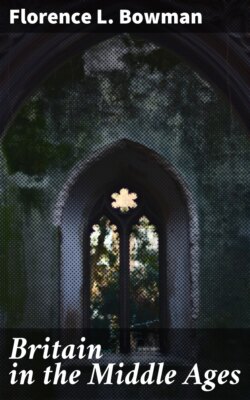Читать книгу Britain in the Middle Ages - Florence L. Bowman - Страница 5
На сайте Литреса книга снята с продажи.
CHAPTER III
ОглавлениеTable of Contents
THE SAXONS
These sea robbers were the Angles and the Saxons, and Britain became Angleland or England. They were fine men, tall and strong, with long fair hair and blue eyes. The Britons gazed in wonder as boat after boat glided into the bays. Graceful, brightly coloured boats they were, with forty oars on each side and a magnificent sail, sometimes made of silk, embroidered with a dragon or a serpent, the gift of a great prince may be. Every sailor, as he stepped ashore, became a soldier, armed himself with his shield which he took from the vessel's side, and a sword, the best in the world, dearer to him than all other treasures, made by the chief, or by a famous blacksmith.
The Britons marked the chief long before he landed, for he stood at the prow or gave orders. His corselet was of beaten gold or bronze, his helmet too. If indeed he were a great champion, he carried on his helmet a pair of eagle's wings, or a cock's comb, as the reward of his bravery and skill in battle. All these men had been soldiers since they were twelve years old. They had learned "to run, to ride, to swim, to wrestle and to leap," so it is no wonder that the Britons fled before them in terror. Some fell into the hands of these stern warriors and became their servants, but those who lived in peace in the mountains of the west were called "Welsh," i.e. "foreigners," by all who heard of them afterwards. The Scots vanished into their fastnesses and the Saxons became lords of Britain.
The Saxons loved fighting and hunting, but when the hunt and the fight were over they came back to their spacious halls, where they hung up their swords and trophies and gathered round the banquet table or sat by the fire, making rhymes and listening to the tales and songs of the gleemen. While the mead cup was being passed round, they heard the songs about the gods and the great heroes of old, and sometimes they liked to think that Odin took a seat amongst them and told his tale. Odin, the one-eyed father of all the gods, crept in with a scarlet cloak wrapped round him, feasted with them, and, at dawn, the doors of the hall opened mysteriously, a great wind blew, and he was gone.
They had many stories about the gods and Valhalla, the home of the spirits, whither every good soldier hoped to journey at the end of his life. Thor was the great god of thunder; you could see his red beard, when the Northern light shone in the winter sky. Sometimes he drove by in his chariot with the sound of a storm, the lightning was the flash of his eye, and the thunder his mighty hammer striking the rocks as he passed.
The most beloved of the gods of the northmen was Baldur, the god of Spring. Once, he had a dream that a great cloud passed over him, and his mother, in sorrow, summoned all the things upon the earth to promise never to hurt her son. Everything promised, the mountains and the trees and the rocks and the rivers, everything except the little mistletoe, which grew at the palace gate and was so small that nobody thought it could do any harm. But Loki, the god of mischief, Baldur's brother, guided the hand of blind Hödur and so killed Baldur with an arrow made from the mistletoe.
Odin was very angry when he heard the news and mounted his war horse to ride to Valhalla, to fetch Baldur from the home of the spirits. But the old witch, who sat at the gates, would not let Baldur return to the earth until she heard that everything on the earth was weeping for him. Everything did weep, except Loki and the little mistletoe. So the witch allows Baldur to come back for three months every year, and then the earth puts on her freshest green, the flowers blossom, the corn ripens, and gods and men rejoice. Thus, the Saxons showed how much they loved the sunshine and the warmth and the south winds that come in the summer time.
When a hero died, the Saxons sent him on his journey to Valhalla, with food enough to last a week and with all his treasures, his sword and helmet, his hunting trophies and his most loved things. They liked best of all to send him on his boat across the unknown seas. They towed it to the harbour mouth, set fire to it, when the sun was going down, shouting as they watched it drift away, "Odin, receive thy Champion." They fancied Odin sat in the far North with all the gods waiting to welcome a brave man and to give him a seat of honour in his hall. For the Saxons thought a brave soldier the noblest of all men.
